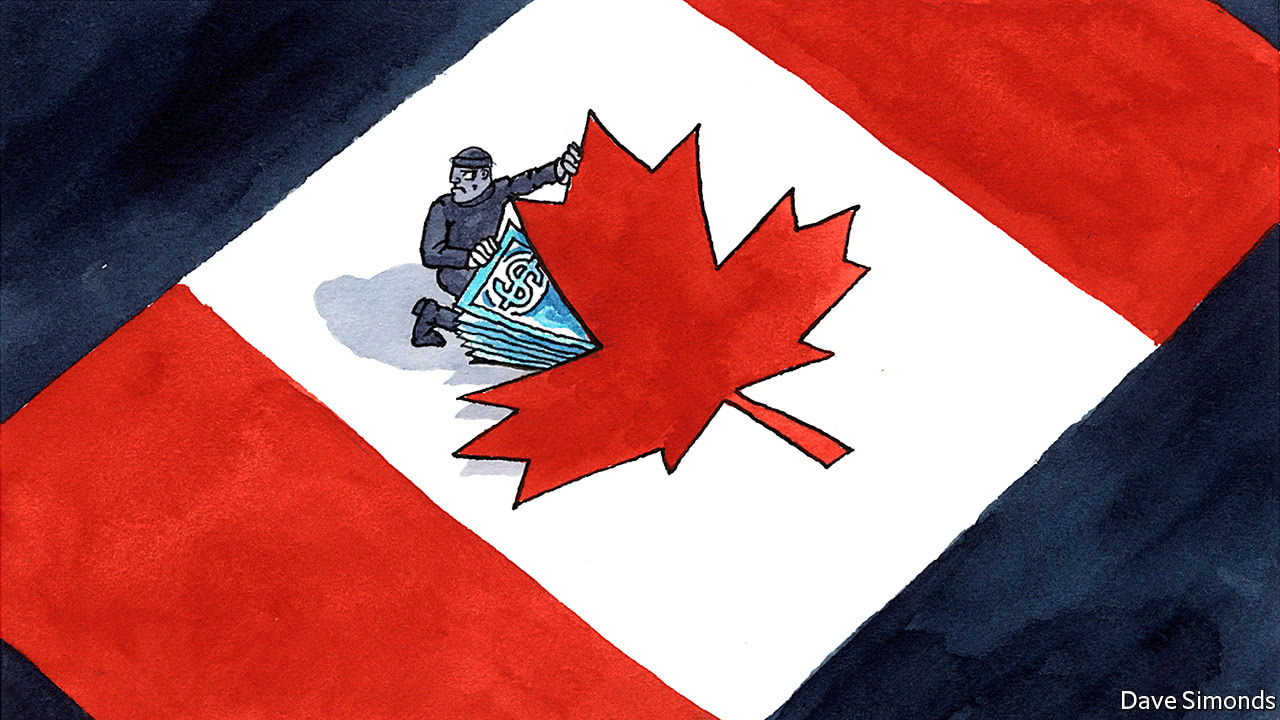
WHEN reports surfaced in 2016 of foreign students with no known income buying homes worth millions of dollars in Vancouver, locals said it was yet more evidence that foreigners were inflating prices in Canada’s dearest property market. It was also evidence of a home-grown problem. The students turned out to be figureheads for anonymous firms whose ultimate owners cannot be identified because the information is not legally required by the land registry. Canadian authorities are concerned about the abuses caused by such opacity. The property market may well be attracting foreign criminals and corrupt officials seeking to launder dirty money, notes David Eby, the attorney-general of British Columbia.
Other countries have taken steps to make sure that anonymous ownership of firms does not help criminals. In 2014 G20 leaders agreed to make the ultimate ownership of legal entities more transparent. Britain, for example, set up a searchable, public database of beneficial or ultimate owners of all firms, limited-liability partnerships and Societas Europaea (firms based and regulated in the European Union as a whole). All EU states will eventually have to do the same under a 2015 anti-money-laundering directive.
-
Will Donald Trump’s pro-coal policies put miners’ lives at risk?
-
Two security flaws in modern chips cause big headaches for the tech business
-
Are America’s airports the worst in the world?
-
Is the bubble only starting?
-
Retail sales, producer prices, wages and exchange rates
-
Foreign reserves
With not a palm tree in sight and a reputation for being boringly well-run, Canada is an unlikely haven for crooks and tax avoiders. But it has long had a reputation as a place to snow-wash money. In 2009 the national police force estimated that up to C$15bn ($12bn) was being laundered in the country each year (an estimated annual $2trn is laundered globally). One attraction is that establishing a company is so easy—tougher identity checks are required to get a library card than to form a private firm, as Jon Allen of Transparency International Canada noted before a parliamentary committee in December.
Not all corporate ownership is opaque. Publicly traded firms are subject to securities laws which require major shareholders to be disclosed. The problem lies with firms that are not listed on a stock exchange. An anti-money-laundering law passed in 2000 directs banks, securities dealers, life-insurance firms and other financial entities to make “reasonable efforts” to identify the owners of firms they do business with; left to carry the load, they do their best to collect information on all counterparties, but it is not enough.
A review in 2016 of Canada by the Financial Action Task Force, an intergovernmental body set up in 1989 to combat money-laundering, concluded that only a fraction of the country’s 2.5m legal entities “had accuracy checks performed with respect to beneficial ownership”. It also catalogued a wide range of ways in which Canadian front companies were being used to purchase assets, including property, or to move money in and out of the country “to layer and legitimise unexplained sources of income”.
Political and legal authorities increasingly recognise a need for change, but progress has been glacial. When finance ministers from the federal government, the ten provinces and three territories met to discuss the issue last month, they went no further than agreeing to encourage firms to keep a record of their ultimate owners, ready to give to authorities if they request it. Part of the problem is that jurisdiction is split between national and sub-national governments, with only a tenth of Canada’s companies incorporated at the national level. Any agreement to change the rules has to reconcile differences in how provinces define beneficial ownership and collect such information.
Canada’s existing money-laundering and terrorist-financing legislation also contains a gaping hole: lawyers are not covered, because they successfully argued in court that turning over such information violated solicitor-client privilege. One Ontario lawyer bragged to a police undercover agent in 2002 that this victory meant it was 20 times safer for a lawyer to launder money in Canada than in the United States—not the sort of contrast that the Great White North relishes.
Source: economist
Canada frets about anonymously owned firms